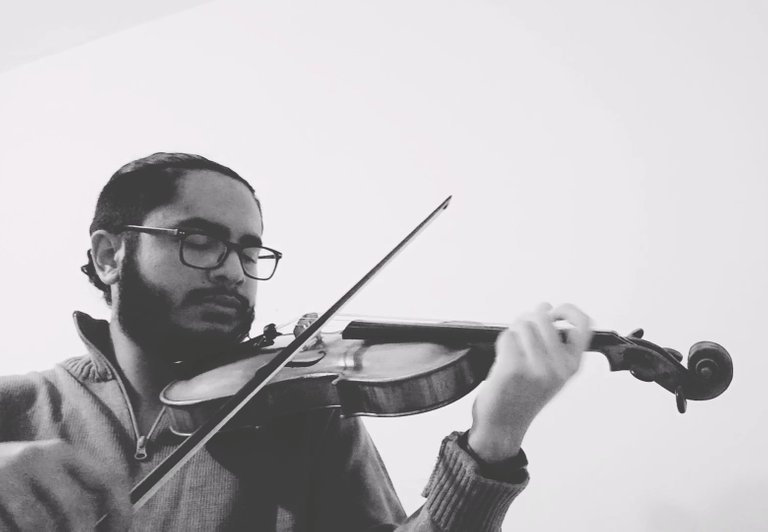
Hola queridos y apreciados amigos, espero cómo siempre estén de lo mejor
Últimamente les he traído a varios compositores que han marcado un antes y un después en las artes, tanto ellos cómo músicos sino también cómo épocas como tal, dándole mucho pero mucho énfasis a la parte interpretativa y técnica, la más compleja,
En el post anterior nos enfocamos en lo técnico de la interpretación de Bach, mostrando así el por qué es tan difícil de entender y analizar.
Uno de los ejemplos es que hoy por hoy como sociedad tenemos más características de la época del romanticismo (en general) que del barroco o el mismo clasicismo, cómo si estuviéramos más acostumbrados al romanticimo. Cómo si nuestros gustos fuesen más hacia ese período,
Ésto puede ser a qué es de los períodos más cercanos y con más diferencias que hoy por hoy se pueden llegar a mantener,
Es por ello que hay cuadros de pintores que hoy por hoy tienen esas características (obviamente una unión de cosas más actuales)
Así que el pocas palabras el romanticismo tuvo cosas que se iban a mantener en períodos y microperiodos siguientes, abriéndose a todos los países del mundo... Y justamente Francia es un punto muy curioso,
Sin ninguna duda la época de Debussy tiene cosas muy románticas, pero también cosas muy nuevas y muy francesas. Las melodías sentimentales, sumado a colores muy nuevos, brillantes y sorpresivos, es lo que vamos a escuchar en toda esa época...
Cuando hablamos de Claro de Luna hablamos justamente de ello, de la melodía sumamente romántica pero con factores misteriosos, impresionistas,
Y de acá va a partir la dificultad de interpretar una obra cómo está, porque podemos decir que tiene cosas muy de Bach, pero también un romanticismo muy marcado, teniendo sorpresivamente momentos tensos, que no vamos a esperar,
Es justo eso lo que debe buscar el músico a la hora de interpretar, una dificultad que nace desde el usar ciertos rasgos de diversas épocas y usarlo siempre a la hora de interpretar ésta música francesa...
PD: Lo prometido es deuda @bethyjade
En el fragmento de hoy escucharemos esas pequeñas pero complejas características, dentro de toda ésta intensa y a la vez tierna melodía, así que sin más que agregar espero les guste, ¡Abrazos!
/

Hello dear and dear friends, I hope you are always the best
Lately I have brought several composers who have marked a before and after in the arts, both they as musicians but also as periods as such, giving a lot, a lot of emphasis to the interpretive and technical part, the most complex,
In the previous post we focused on the technical aspects of Bach's interpretation, thus showing why it is so difficult to understand and analyze.
One of the examples is that today as a society we have more characteristics of the era of romanticism (in general) than of the baroque or classicism itself, as if we were more used to romanticism. As if our tastes were more towards that period,
This may be what is the closest period and with more differences that can be maintained today,
That is why there are paintings by painters that today have these characteristics (obviously a union of more current things)
So in a few words, romanticism had things that were going to be maintained in subsequent periods and microperiods, opening up to all the countries of the world ... And France is precisely a very curious point,
Without a doubt, the Debussy era has very romantic things, but also very new and very French things. Sentimental melodies, added to very new, bright and surprising colors, is what we are going to hear throughout that time ...
When we talk about Claro de Luna we are talking about it, of the extremely romantic melody but with mysterious, impressionistic factors,
And from here the difficulty of interpreting a work as it is begins, because we can say that it has things very Bach, but also a very marked romanticism, surprisingly having tense moments, which we will not wait,
This is exactly what the musician should look for when interpreting, a difficulty that arises from using certain features from different times and always using it when interpreting this French music ...
In today's fragment we will hear those small but complex characteristics, within all this intense and at the same time tender melody, so without further ado I hope you like it, Hugs!
Resteemed, your post will appear in the next curation post with a share for you!
Your post has been supported and upvoted from the Classical Music community (Subscribe at peakd) as it appears to be of interest to our community. We also support jazz and folk music posts!
If you enjoy our support of the #classical-music community, please consider a small upvote to help grow the support account!
You can find details about us below.
Peakd and DiscordHive Vote!
Congratulations @gregorior! You have completed the following achievement on the Hive blockchain and have been rewarded with new badge(s) :
Your next target is to reach 800 replies.
You can view your badges on your board and compare yourself to others in the Ranking
If you no longer want to receive notifications, reply to this comment with the word
STOPCheck out the last post from @hivebuzz:
¡Gracias gracias graciaaaas! Ni siquiera sé a ciencia cierta como explicarlo pero, sencillamente cada vez que oigo la pieza, me siento plena (no se cuantas veces más he repetido el video hahaha). Mi hermana también lo disfrutó mucho.
Tienes un gran talento y es genial que decidas compartirlo con nosotros, en la actualidad hay cada vez menos personas que aprecien la música de calidad, y cada vez que veo a un verdadero artista, me siento muy feliz. Gracias de nuevo por esos minutos de felicidad, saludillos.
Nada que agradecer, siempre es bonito interferir musicalmente con quiénes escuchan, abrazote💕 gracias a ti por tomarte el tiempo de escuchar